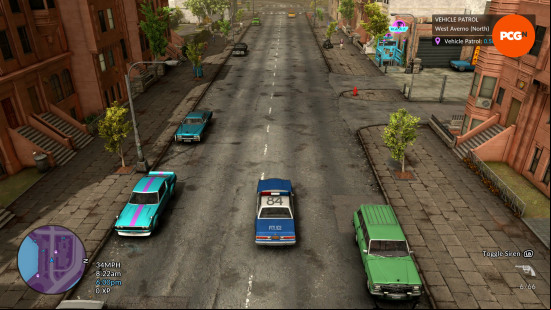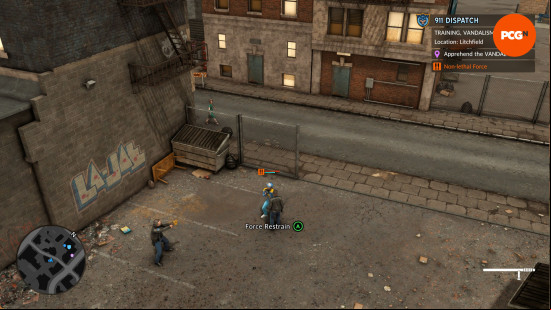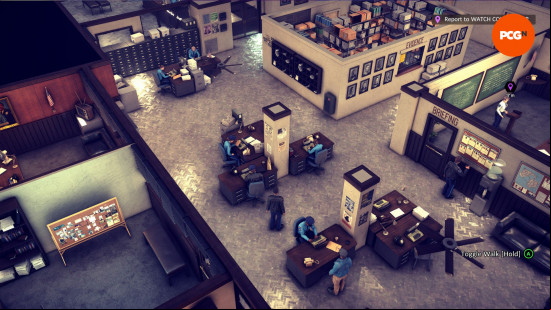Verdict
The Precinct takes a welcomingly sober approach to videogame policing, focusing as much on the mundane as the action-filled aspects of the job. But this isn’t enough to make enduring hours of its repetitive mission design and poor writing worthwhile.
The Precinct wants to make you feel like a real cop. It doesn't necessarily want that feeling to involve just replicating the larger-than-life car chases and shootouts of an action movie, the intensive crime scene investigation of a detective, or the mundane aspects of filing paperwork at a station desk. Instead, it aims to simulate the working life of a cop by blending all of the above into a lumpy mixture of boring and exhilarating – something that's meant, in its heightened recreation of the job's ebbs and flows of excitement, to offer a different kind of police simulation.
It's not necessarily a bad idea. Police dramas often glorify the job by casting cops as ground-level superheroes, tirelessly working toward the application of justice, no matter how imperfect that justice might be. The Precinct tries to muddy the waters of policing, though, not through explicit moralizing but with subtler systems that introduce doubts as to the validity of law enforcement tactics taken for granted as ethically correct. Unfortunately, its approach is troubled by a confused tone and missed opportunities mired in numbing repetition.

Part of its potential bite is softened by the choice to distance itself from the modern world. It takes place in the fictional, crime-ridden Averno City in the 1980s, which it portrays with the exaggerated counterpoint of bright neon sleaze and street-level grime that characterizes popular depictions of NYC in that same decade. There's a cartoonishness to The Precinct that extends beyond its hand-drawn character portraits and colorful cityscape. In its desire to model both grounded, unglamorous policing and action movie bombast, there's a strange volleying back and forth between uncomfortably realistic and disposable fantasy in the arrests, searches, and gunfights.
The game's premise is sound enough. You assume the role of a rookie called Cordell, son of the city police department's mysteriously murdered former chief. Once you're shown the ropes of an average patrol, whether on foot, in a squad car, or at the controls of a helicopter, you settle into a regular cycle of shiftwork. You have a selection of patrols to take on each day, ranging from handing out parking tickets to monitoring the city for drug deals. You earn experience points for issuing appropriate fines, properly searching and detaining suspects, and making arrests. Gain enough points and Cordell levels up, earning new abilities, weapons, and perks.

The cycle of repeating patrols is novel at first but soon grows dull as the same scenarios repeat. Cordell works with a partner, and you can delegate the process of laying criminal charges or bringing your arrested suspect back to the police station to either them or other colleagues. But you will almost always need to radio in an ID to check for prior charges or warrants, pat down the suspect for contraband, or run a breathalyser on a bad driver. Failing to do so deducts experience points, and properly following every step makes each arrest a lengthy enough process that repeating it dozens of times in a single shift becomes a test of patience.
When a larger-than-life car chase or gunfight does break out, it's barely more exciting. The driving design is serviceable, as are the shooting systems based on popping in and out of cover, sometimes waiting for Cordell's health to automatically recharge, until the enemies are all dead. But they require very little by way of tactical thinking and offer even less in of punchy or a sense of danger. Cordell and his opponents barely flinch when shot. The guns don't have weight. The car chases involve so much ridiculous accidental property destruction that the city and its vehicles, creations of solid brick and reinforced steel, seem to be made out of wet paper towels.

The only greater reward promised for good policework – aside from experience points – is progress in larger cases gained by picking up evidence while on the beat. Handing it in at the end of a shift can unlock clues for a trio of suspects in two different gangs, the Jawheads and the Crimson Serpent, eventually opening up a mission to head out and arrest them. These missions are somewhat more compelling than patrols, and they guarantee at least a little action, whether a helicopter or car chase or prolonged gunfight. They're spread thin, though, and sometimes feel too close to the encounters you have during routine patrols. One rooftop gunfight ends up resembling another. One car chase is much like the next.
The writing is far too unexciting to enliven things. Once the plot is established, nothing much happens for the remaining nine or ten hours. The leaders of the Jawheads and Crimson Serpents are eventually found and confronted and, as if finally ing to answer questions raised during the game's introduction, a brief concluding sequence returns to the mystery of Cordell's slain father with a perfunctory endcap. The characters aren't any better. Cordell is a blank slate, and his fellow cops provide either bland exposition or collegiate ribbing about eating too many doughnuts. The incidental dialogue is particularly awful. Averno City's population walks around spouting inane, context-free '80s movie references. "Never feed him after midnight," one woman says aloud to no one as she strolls down the street. "Nobody puts Baby in a corner," offers another, unprovoked. Others walk through parks or down sidewalks stating: "If you build it, they will come," "The machine shrunk my kids," or "I can't believe Vader was his father!"

It's hard to feel much of what might be intended. The Precinct implicitly criticizes accepted police conduct by deducting experience points for writing up false charges or using excessive force. There's a sense that the game wants you to bristle at how a simulation of 'correct' police behavior might find it appropriate for an officer to pull someone over for throwing litter from their car window, then proceed to order them out of their vehicle and submit to a pat-down and breathalyser test.
But the whiplash between moments of potentially quiet contemplation and those that are more absurd, featuring quote-yelling pedestrians or hyper-destructive car chases, makes it difficult for The Precinct to establish a sense of cohesion. Unable to decide whether it's more interested in modeling either the action movie image of a cop or the less exciting, often disconcerting realities of the job, the game fails to find much worth simulating in either area. Without a strong plot or cast of characters to compensate, I can't recommend The Precinct other than for the novelty of its design goals.
